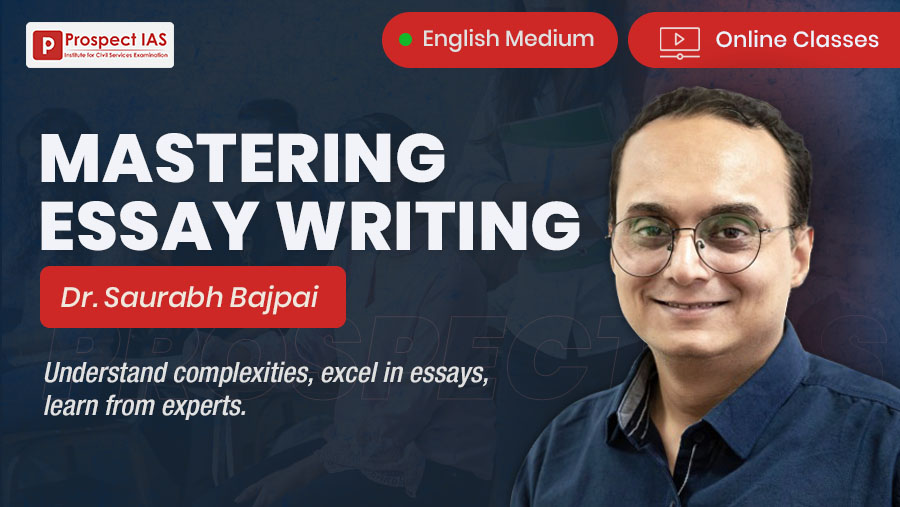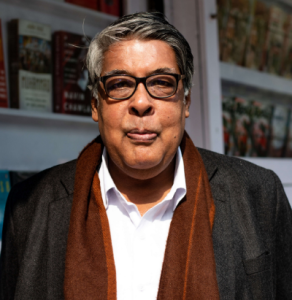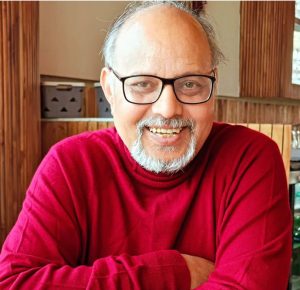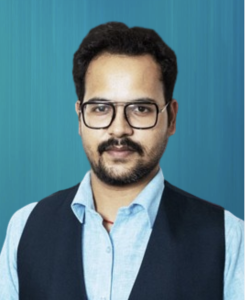Prospect IAS’s Mastering essay writing course aims to develop a candidate’s ability to articulate their thoughts coherently and succinctly on relevant essay related topics. The UPSC essay syllabus covers a wide array of topics ranging from socioeconomic issues to political and philosophical musings. Candidates must focus on developing their writing skills and analytical abilities rather than becoming experts in specific subjects.
The topics for essay writing can encompass national and international importance, relevant social, economic, political, cultural, historical, geographical, and contemporary issues. Candidates should choose familiar topics and express their opinions coherently and structured.
The essay course at Prospect IAS is taught by a distinguished faculty pool who have studied from and taught at Jawaharlal Nehru University and Delhi University, renowned for their comprehensive understanding of different issues acknowledging different milieus.

₹5,000 ₹3,750 Discount of 25% applied
This Batch includes
Duration: 3 Weeks
Validity: One year, Unlimited Backup
- Live Lectures with backup
- 4 classes in a Week (2:30 to 03:00 Hrs)
- In-depth Study and Conceptual Interlinkages
- Assessment and Feedback: Practice sets with Model structure
- Exclusive Material, learning aid made by the faculty
- 10 Comprehensive Tests (Full length)
- Special Sessions: Doubts, Articulation Tips, Mentoring
In-depth Study
Focus on different topics like Technology and Society, Environmental Issues, Education, Health and Wellness, Social Issues, Globalization, Politics and Governance, Economy, Science and Ethics, Art and Culture etc.
Teaching to Write
The course teaches writing with structured paragraphs: narrative, supportive, critical, emphasizing clear, concise, and coherent essays, focusing on interdisciplinary approaches and topic relevance.
Preparing to Write
The course offers understanding essay types, staying updated on current affairs, improving language skills, time allocation for planning.
Enhancing Competence
The course enhances candidate’s competence by providing organized outlines, teaching topic thoroughly via simple language, word limit adherence, factual support, and teaching how to avoid common mistakes.
Know your Faculty
To excel in the Essay paper of the UPSC examination, aspirants need a blend of analytical skills, in-depth knowledge, and effective writing techniques. The collective expertise of Dr. Saurabh Bajpai, Prof. Purushottam Agrawal, Mr. Rajveer Singh, and Mr. Aditya Pandey offers a comprehensive foundation for aspirants to enhance these essential skills.
Special Orientation by Prof. Purushottam Agrawal
- Former UPSC Member (2007-2013): Prof. Agrawal’s tenure as a member
 of the Union Public Service Commission (UPSC) provides him with an unparalleled understanding of the examination process, including the evaluation criteria for essays. His insights can help aspirants understand what examiners look for, such as clarity, coherence, originality, and a balanced perspective in essay writing. His familiarity with diverse subjects helps aspirants address topics related to ethics, society, and governance effectively.
of the Union Public Service Commission (UPSC) provides him with an unparalleled understanding of the examination process, including the evaluation criteria for essays. His insights can help aspirants understand what examiners look for, such as clarity, coherence, originality, and a balanced perspective in essay writing. His familiarity with diverse subjects helps aspirants address topics related to ethics, society, and governance effectively. - Academic Leadership and Teaching Experience: As a former chairperson of the Centre for Indian Languages at Jawaharlal Nehru University (JNU) and a visiting professor at prestigious institutions like the University of Oxford, EL Colegio de Mexico, and the University of Cambridge, Prof. Agrawal brings:
- Linguistic Proficiency: His expertise in languages and literature can guide aspirants in improving their writing style, making their essays more articulate and engaging.
- Analytical Depth: His academic background encourages a critical analysis of topics, fostering a deeper understanding and more nuanced arguments in essays.
- Esteemed Author and Scholar: Prof. Agrawal’s prolific writing includes influential works such as Akath Kahani Prem Ki: Kabir Ki Kavita Aur Unka Samay (2009), Padmavat: An Epic Love Story (2018), and Who is Bharat Mata? (2019). These contributions highlight his ability to explore complex themes and present them in an accessible manner. His books provide:
- Cultural and Historical Insights: Aspirants can draw on his extensive knowledge of Indian culture, history, and literature to enrich their essays with relevant examples and references.
- Thematic Exploration: His exploration of themes like love, politics, and identity in his books can help aspirants develop essays with a strong thematic focus.
- Media Presence and Public Engagement: As a well-known panellist on TV debates and host of the book show Kitab on Rajya Sabha TV, Prof. Agrawal’s experience in public engagement ensures:
- Current Affairs and Debate Skills: His participation in debates provides aspirants with strategies to present balanced arguments and address counterpoints effectively in their essays.
- Presentation and Communication: His media presence exemplifies the importance of clear and effective communication, a crucial skill for writing impactful essays.
- Notable Lectures and Publications: Prof. Agrawal’s notable talks, such as the Gandhi Peace Foundation lecture Majbooti ka naam Mahatma Gandhi (2005), and his monograph on Nehru’s writings, Who is Bharat Mata? (2019), offer:
- Philosophical and Ethical Perspectives: His works provide valuable insights into philosophical and ethical issues, enabling aspirants to tackle essay topics related to ethics, governance, and social justice with greater depth.
- Inspirational Content: His analysis of figures like Gandhi and Nehru inspires aspirants to incorporate visionary and inspirational content into their essays.
Prof. Purushottam Agrawal’s rich academic background, extensive authorship, media presence, and experience as a UPSC member equip UPSC aspirants with a well-rounded perspective on essay writing. His guidance can help aspirants develop essays that are insightful, well-structured, and reflective of a deep understanding of the subject matter.
Dr. Saurabh Bajpai (Director, Prospect IAS)
- Recipient of the highest award from the Indian History Congress: Dr. Bajpai’s recognition by the Indian History Congress signifies his profound understanding of historical contexts and analytical prowess. His expertise enables aspirants to:
- Craft Well-Researched Essays: His deep insights into history can help students incorporate historical perspectives and data, adding depth and credibility to their essays.
- Analytical Thinking: Aspirants can learn to analyze historical events critically, a skill that is transferable to addressing contemporary issues in essays.
- Ex-Assistant Professor, University of Delhi, 10 years of teaching experience in DU and PhD from JNU brings:
- Pedagogical Excellence: His teaching experience ensures aspirants are guided with effective learning strategies and frameworks for essay writing.
- Research-Oriented Approach: Emphasis on rigorous research methodologies can help students present well-supported arguments in their essays.
- A prolific author with deep insights into essay writing: Dr. Bajpai have been publishing in reputed newspapers, journals and magazines for last more than 15 years. He prolific writing career aids aspirants in:
- Writing Techniques: Learning the art of structuring essays, developing coherent arguments, and maintaining clarity and precision.
- Stylistic Elements: Enhancing language proficiency and stylistic elements to make essays engaging and persuasive.
- He is awarded the most prestigious fellowships from Jawaharlal Nehru Memorial Fund and Indian Council of Historical Research which provides: Deep understanding of History, thus providing a strong base while writing an essay.
Mr. Rajveer Singh
- M. Phil, JNU: Mr. Singh’s academic background and extensive experience offer:
- Economic Understanding: Insights into economic development and MSMEs, helping aspirants address economic topics with practical knowledge.
- Policy Analysis: Ability to critically analyze and propose policies, valuable for essay topics related to governance and economic reforms.
- With over 35 years of extensive experience in local economic development, specializing in MSMEs: His 35 years of experience ensure
- Practical Applications: Real-world examples and case studies to support theoretical arguments in essays.
- Collaboration and Development Programs: Understanding of global and national development initiatives, aiding in the discussion of international relations and development policies.
- Spearheaded numerous industry development programs in collaboration with esteemed organizations like UNIDO, World Bank, ADB, ILO, SIDBI and various government bodies
- Aspirants can draw on Mr. Singh’s hands-on experience with international and national development programs to include relevant and contemporary examples in their essays.
- Detailed case studies of successful initiatives can be used to illustrate points and provide concrete evidence to support arguments.
- His expertise in the implementation of policies through these development programs offers a deep understanding of how policies translate into practice, helping aspirants critically analyze and propose solutions to policy-related essay topics.
- Exposure to both global (UNIDO, World Bank, ADB, ILO) and local (SIDBI, government bodies) perspectives on economic development enriches essays with a balanced viewpoint.
- Insights into various development strategies employed across different contexts can help aspirants propose well-rounded and practical solutions to economic challenges discussed in essays.
Aditya Pandey (Academic Director, Prospect IAS)
- Resource person at Directorate of Training, Union Territories Civil Services: Mr. Pandey’s role provides:
- Training Expertise: Structured training methods and effective study techniques to enhance essay writing skills.
- Civil Services Insights: Knowledge of civil service requirements and expectations, aligning essay content with these standards.
- Former Assistant Professor, DU, MPhil, JNU: His academic and teaching background ensures:
- Academic Rigour: Emphasis on thorough research and well-founded arguments.
- Mentorship: Personalized guidance and feedback, crucial for refining essay-writing abilities.
- UGC DAAD fellowship holder: This prestigious fellowship highlights:
- International Exposure: Broadened perspectives and comparative analysis skills, enabling aspirants to incorporate global viewpoints.
- Research Excellence: Encouragement towards meticulous research, ensuring well-supported and compelling essays.
- Doctoral Research Focus: Aditya Pandey’s doctoral research examines the binaries in the discourse on land issues and the emerging land system in West Champaran.
- Deep Understanding of Land and related social Issues: Students can leverage his insights to write comprehensive essays on land reforms, agrarian issues, and rural development.
- Historical and Social Analysis: His approach to examining historical contexts and social forces equips students to incorporate nuanced perspectives and critical analyses in their essays.
- Research Interests: Aditya’s diverse research interests cover critical areas such as inclusive citizenship, constitutionalism, historical injustice, climate uncertainty, and sustainable livelihoods. These topics are highly relevant to the UPSC essay paper:
- Inclusive Citizenship and Constitutionalism: Students can gain a thorough understanding of governance, rights, and democratic practices, enhancing their ability to write on related topics.
- Historical Injustice and Democratic Rights: His research on these themes provides students with a framework to discuss social justice and policy issues effectively.
- Climate Change and Sustainable Livelihoods: Insights into climate uncertainty and sustainable practices help students address environmental topics with depth and practical examples.
- Research Projects: Aditya’s involvement in significant research projects of Indian Council for Social Science Research (ICSSR), Centre for the Study of Developing Societies (CSDS).
